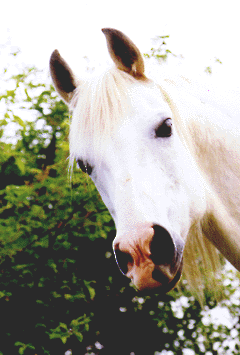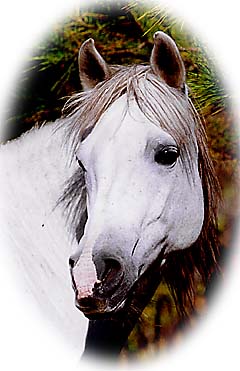Decended in all lines from the 1906 Desert Importation by Homer Davenport
|
The story of the chestnut Seglawi Jedran mare, Urfah
|
|
excerpted from MY QUEST OF THE ARABIAN HORSE, Homer Davenport, New York, 1909 |
| Smile
and the world smiles with you... |
|
  |
We
were waked in the morning by the neighing of the horses we had purchased
and found we had been aroused by the approach of a Bedouin riding a bay
mare and leading a two-year-old colt.
The latter, it seemed, was the Seglawi Jedran colt, which the Anezeh had promised to send to me for inspection. Before we could leave the tent Haffez sent word to us to stay in our tents as long as possible. This Seglawieh Jedranieh mare, he said, was the finest possessed by the Anezeh. She had been brought, not to be sold herself, but to show what her colt was worth. He would buy the colt as cheaply as possible and then, later, would refer in an off-hand and indifferent way to the mother. Through the flap of the tent we admired the pair, Mother and son were as much alike in general character, as two peas. There were the same markings on their white legs, the same general character of hind quarters, and the same very "racy" appearance throughout. ... After breakfast the Bedouin was was brought to me, his hand was placed in mine, while the Arabs jabbered and I knew that the colt had finally been purchased. The Bedouin even promised that he would go to his tent and bring the yearling brother of the colt, a chestnut with the same markings, and join us where we were to camp that night, five hours on towards Aleppo. As we departed the mare was a picture. She walked with the grace of a well-bred woman; her tail would gracefully sway from side to side; her ears were ever in motion, and her eyes sparkled. The very sight of her rested us from the long day's ride of the day before and then she broke into a gallop and her swinging tassels were soon lost sight of as she disappeared on the horizon. The mother out of sight, we turned to look at her two-year-old son. He seemed finer than others we had of the same age. There was an inherited dignity which the rest did not have. We were already anxious to see his full brother which was supposed to be better still. Both of them were sired by the great Hamdani-Simri chestnut horse that the Anezeh are so proud of and thus combined the two rare breeds of the desert, the Seglawi Jedran and the Hamdani Simri. The mother was a Seglawieh, and thus according to desert rule the colts were of blood of the Seglawi Jedrans. That night we camped at a village owned by relatives of Akmet haffez. At ten o'clock the Bedouin returned with his beautiful mare, bringing her baby and last child, a chestnut colt, big for his age, with white in the face, and with the same peculiar white feet as his mother and brother. His mane and tail were light yellow, giving him a babyish appearance. he was even finer than the two-year-old. ... Yet we were loth to start, and there was another reason for this beside our unwillingness to part from Akmet Haffez. The Seglawieh Jedranieh mare, whose two sons we had bought and to complete whose purchase we had sent by a soldier the fifty pounds extra demanded by her owner, had not appeared. ... ...the soldier came in our of breath and he had not said many words before Akmet Haffez's eyes blazed with anger and he arose and picked up a rifle from the couch. What was the trouble? This simply: The mare's owner had counted out the fifty pounds brought by the soldier and then had demanded further a revolver he had seen one of our party carryingThat was what had roused our host. He had given his word before Allah that we should have the mare and he would keep his word if it took rifles to help him do it. And the old man had his way. "I will send to get the mare," said he. "My own son Faiot, who is also your son, shall go and he shall bring her back alive or her owner dead." I yielded, not without hesitation, for I wanted the animal, as she was the best in the Euphrates valley, and, anyway, to ease my conscience I sent along the revolver which her owner had demanded. Faiot and the soldier started at once on their fifteen hours' ride as we broke camp in the opposite direction. They would try to catch us on the second night.ness to part from Akmet Haffez. ... It was now the third night out from Aleppo and there was no news from the mare. Suddenly about nine in the evening there was a cry of "Faiot," and the son of Akmet Haffez came galloping up on "The Pride of the Euphrates," She was the same beautiful animal despite her journey. Her eyes had the same sparkle and sh looked better than when we first saw her. ... ... The interpreter then had a story to tell. ... When the son of Haffez went to him with the revolver the owner found fault with the weapon, saying it was not the one he wanted. he was so sore that before he would give up the mare he declared he would leave the Anezeh tribe and go to Brihem Pasha, who, to get the blood of his mare in his tribe, would defend him with his six thousand armed men. Where-upon the soldiers covered him with the very pistol he had sent for, while Haffez's son, Faiot, took the mare by force. later he was arrested and brought to Aleppo because he had broken his word about a horse which he really did not want to sell. ... The next day at Alexandretta, the Arabs from the mountains knew all about the bay mare, though we had not told the story to a soul. They came to see her in great numbers, and were sorry she had been taken away from her owner. |
|
|
|
Page II: Homer Davenport is Received by the Anezeh Bedouin Page III: How Davenport's aquired the grey Kehileh-Heife mare *Reshan Page IV: The story of the chestnut Seglawi Jedran mare, Urfah |
Email: is always welcome
This page hosted by ![]() Get
your own Free
Home Page
Get
your own Free
Home Page